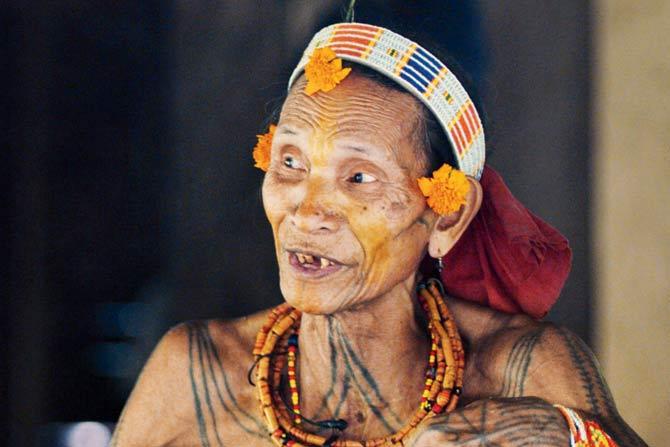The most ancient tattoo traditions practiced by fast diminishing tribes, including two from India, make it to a docu by a Dutch couple, striking a conversation about who has the right to access God and the transience of life.

Tattooed warrior Panchun told the film team that before the British arrived to their land, the group was split into multiple entities, identified by the geographical location and tattoo patterns. These days, they identify themselves as one, the Konyaks of
In March 2018, Sophie Brouwer and Michael Zomer travelled to the Mentawai Islands, 150 kilometres off the western coast of Sumatra in Indonesia, for the world-s toughest yacht race, the Volvo Ocean. While they were exploring the jungle-fringed beaches, they encountered members of the indigenous Mentawai tribe. It must have been a pleasant distraction because the chance meeting birthed their first self-funded documentary. "Their bodies were decorated with traditional tattoos; we were inspired. Michael is a self-taught filmmaker and I, an anthropologist. So, we thought, let-s combine our passions and create a film on the planet-s oldest tattoo practices," says Brouwer, 30, who hails from Utrecht in the Netherlands. That traditional tattooing predates any written language or script means that ink drawings on skin can reveal substantial information about the fundamentals of human existence.
The duo-s Instagram page gathered over 10,000 followers within one month. "People were liking our work even before we had started. And so, crowd funding seemed like the best bet," says Zomer, 29.
ADVERTISEMENT

A Ramnami tribal has the word Ram tatooed across his torso, as a symbol of having surrendered his allegiance to the Lord
The Mentawai were the starting point. Over the next one-and-a-half years, the pair spent time on research to zero in on the four tribes they would focus on. The Mentawai, the Konyaks in Nagaland, the Ramnami in Chhattisgarh and another in Africa, yet to be finalised, have become the focus of Patterns of Life, a documentary series of four episodes, each 25 minutes long.
Three months ago, Brouwer and Zomer landed in India to film in Nagaland. Anthropologist Dr Lars Krutak, with over 25 years experience in traditional tattoo practices, was their sounding board and companion during interactions with the Konyaks, the largest of the 16 tribes of Nagaland. An isolated lot, they are an ethnic group characterised by the ancient headhunting practice and elaborate tattoos including on their face. "In the 1950s, if the tribals picked a war with their neighbours, taking the enemy-s head was common practice. With that win, you also won yourself the privilege of a tattoo. And the Konyaks wear their tattoos like medals of honour. Only the king, however, could get the tattoo of a tiger," Sophie explains of their belief in animalism. "The king believed that he could see or hear the tiger even in his dream if he had this tattoo. It is quite fascinating." The tattoos, in a sense then, were a map of an individual-s achievements, experience, status and rights of passage. They use spikes from the lemon tree and ink made from ash to hand-tap deep purple-black tattoos on to a human canvas. While most are now followers of Christianity, the banning of headhunting in the early 1900s means that they are less warriors and more given to farming.

Sir Bajak Rotcak of the Mentawai tribe plays an important role as the transmitter of knowledge about plant medicines and maintaining unity
The Ramnamis of Chhattisgarh, on the other hand, wore tattoos that were religious in nature. "From the lower strata, they were restricted from entering temples. After years of fighting social exclusion, they used their tattoos to launch a movement," Brouwer explains. Netherlands-based anthropologist Jitske Kramer, who is author of the book, Building Tribes, accompanied the duo. "The Ramnamis tattoo patterns with the name of Lord Ram on their bodies. It is their way to give their body to God, and to visibly express that they will live according to the Ramnami moral rules, including a non vegetarian diet, chanting every day, not utter negative words, not lie or gamble and stay away from alcohol. Unfortunately, they continue to be kept out of religious institutions, although they have surrendered their bodies to the Lord," says Kramer.
 Traditional facial tattoos worn by a female member of a Myanmar tribe feature in the documentary
Traditional facial tattoos worn by a female member of a Myanmar tribe feature in the documentary
Kramer sees the approach as one creating a unique identity in a time of oppression, as well as offering full commitment to their God. "Patterns of Life focuses on traditional tattoos, symbolising ancient wisdom and valuable history. There are many multiple reasons why our ancestors started tattooing. Some patterns are believed to have a healing power, others give you personal strength. It is important to preserve this ancient wisdom and inspire the world with a forgotten perspective," Kramer believes.

Sophie Brouwer and Michael Zomer with a member of the Ramnami tribe
The core team of Brouwer, Zomer and second camera operator Floris Tils, plan to release the film in 2021. "We want to give the film back to the people, and we plan to travel with it to the same tribes we covered. The youngest members are quite modern, and we think it will be the perfect way to reconnect them with their ancestors," Brouwer says.
Catch up on all the latest Mumbai news, crime news, current affairs, and also a complete guide on Mumbai from food to things to do and events across the city here. Also download the new mid-day Android and iOS apps to get latest updates
 Subscribe today by clicking the link and stay updated with the latest news!" Click here!
Subscribe today by clicking the link and stay updated with the latest news!" Click here!







